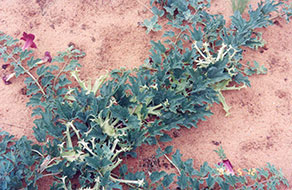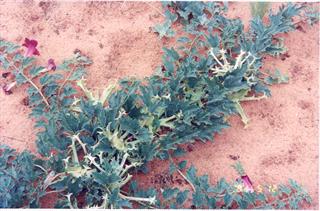ABVS invites feedback; comment period ends Sept. 1


Harpagophytum procumbens, commonly called devil's claw, is a perennial that thrives in arid conditions. Known for its anti-inflammatory and analgesic properties, devil's claw is used in human and veterinary medicine to alleviate pain associated with degenerative conditions such as arthritis, as well as in tendon and ligament injuries.
If advocates of herbalism in veterinary practice have their way, the American College of Veterinary Botanical Medicine will become the 23rd specialty group recognized by the American Board of Veterinary Specialties, or ABVS.
Members of the college made their bid in a 352-page petition to the ABVS, an organization of the American Veterinary Medical Association that registers veterinary specialties in the United States.
The public is invited to review the petition and comment by Sept. 1. Feedback can be sent to the ABVS c/o David Banasiak, 1931 N. Meacham Rd, Suite 100, Schaumburg, IL, 60173, or by email to DBanasiak@avma.org.
Comments will be considered by ABVS-appointed reviewers and forwarded to the college's Veterinary Botanical Medicine Specialty Organizing Committee for response. According to the ABVS website, the AVMA Committee on the Development of New Specialties "shall prepare a recommendation, including a motion on the status and future development of each college." The recommendation is due by Feb. 1, ahead of the ABVS' annual meeting in late winter or spring.
The path to ABVS recognition is multifaceted. Petitioning organizations must fulfill a plethora of requirements to achieve provisional status as a recognized veterinary specialty organization, or RVSO. If the requirements are met, the ABVS forwards the petition with a recommendation for provisional recognition to the AVMA Executive Board, which has the final say.
After having provisional status for four to 10 years, the RVSO can petition for full recognition.
The criteria specifies that petitioning organizations must demonstrate that they will "serve a clearly defined need within the profession." The veterinary botanical medicine college says it "reflects the growing public demand for botanical options, increasing use by pet food companies incorporating botanicals, increasing availability of botanicals for animal use, significant research and use by the production animal industries (aquaculture, dairy, swine and poultry) and increasing use and teaching of students by university veterinary colleges faculties."
Making a case for a unique specialty rather than incorporating herbal medicine into other specialty colleges, the petition states: "No other specialty possesses the unique set of skills and knowledge required by herbal medicine practice. If herbal medicine became a subspecialty of pharmacology or any other RVS, too much additional knowledge and experience would be required of diplomat. An even larger concern is the dilutional effect that training in the other RVS plus herbal medicine would have on the practice of herbal medicine."
The proposal is encountering some resistance. Dr. Brennen McKenzie, for example, says he's receptive to herbal medicine but believes the discipline too often is plagued by unscientific concepts, limited scientifically rigorous evidence and insufficient regulation.
On his website SkeptVet, McKenzie writes: "In theory, such an area could be a legitimate scientific specialty if the attitude towards science changes and the evidence base is properly developed, but that is not yet the case. No herbalism specialty is recognized in human medicine or veterinary medicine in the US, Europe, or Australia, which would make recognition of the ACVBM unprecedented."
This article has been changed to remove a hotlink to a webpage that is no longer available.